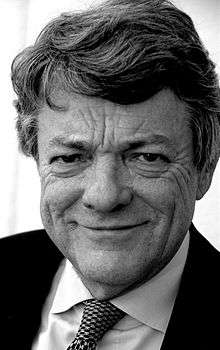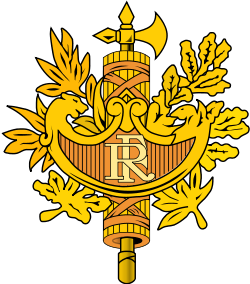Jean-Louis Borloo
| Jean-Louis Borloo | |
|---|---|
 Borloo in 2013 | |
| Minister of Ecology, Energy, Sustainable Development, Territorial Development and for the Elderly | |
|
In office 19 June 2007 – 13 November 2010 | |
| President | Nicolas Sarkozy |
| Prime Minister | François Fillon |
| Preceded by | Alain Juppé |
| Succeeded by | Nathalie Kosciusko-Morizet |
| Personal details | |
| Born |
7 April 1951 Paris, France |
| Political party | UDI (2012-present) |
| Other political affiliations |
Independent (1989-1990) UDF (1990-2002) PR (2002-2012) |
| Spouse(s) | Béatrice Schönberg (m. 2005) |
| Residence | Valenciennes, France |
| Alma mater |
Panthéon-Sorbonne University HEC Paris |
Jean-Louis Borloo (French pronunciation: [ʒɑ̃ lwi bɔʁlo]; born 7 April 1951 in Paris) is a French politician and was the leader of the Union of Democrats and Independents, and French Minister for Ecology, Energy, Sustainable Development and Town and Country Planning (Regional Development)[1] between 2007 and 2010. On 6 April 2014, he announced in a letter that he would resign from every mandate or responsibility, due to health reasons.
Early life
Borloo gained his Baccalauréat in 1969, in the Philosophy stream. In 1972 he took a first degree in Law and Philosophy at the Pantheon-Sorbonne University, in 1974 a further degree in History and Economics at Paris X Nanterre, and in 1976 an MBA at HEC Paris.[2]
Political career
Of Picard origin, Borloo began his career as a lawyer in the 1980s. He became president of the Valenciennes Football Club in 1986. In 1989, he was elected mayor of Valenciennes as an Independent, winning over 76 per cent of the vote.
In the June 1989 European elections, Borloo was elected to the European Parliament as the second candidate on Simone Veil's list. He held this seat until his election as regional councillor for the Nord-Pas-de-Calais in 1992.
Borloo was elected to the French National Assembly as a Miscellaneous Right candidate representing the Nord's 21st constituency in 1993. Joining the caucus of the UDF, he was re-elected in 1997, two years after his re-election as Mayor of Valenciennes.
He was a founding member of Ecology Generation in 1990, but he later joined the Union for French Democracy led by François Bayrou. However, in 2002 he joined the Radical Party, associated with the new Union for a Popular Movement. He was co-president of the Radical Party alongside André Rossinot between 2005 and 2007, when he became sole President of the party.
It was on the Radical-UMP ticket that Borloo was re-elected as a deputy in 2002 and 2007. He was Minister for the City and Urban Renewal in the Jean-Pierre Raffarin governments between 2002 and 2004, Minister of Labor, Employment and Social Cohesion under Raffarin between 2004 and 2005, and finally Minister for Employment, Social Cohesion and Housing in the Dominique de Villepin government between 2005 and 2007. In that role, he introduced a five-year plan of social cohesion, which was centered around three axes: equal opportunity, housing and employment.
On 21 July 2005 Borloo married news anchorwoman Béatrice Schönberg at Rueil-Malmaison, Hauts-de-Seine.
From 18 May to 19 June 2007, he was Minister of the Economy and Finance in the François Fillon cabinet. Between 19 June 2007 and November 2010, he was the French minister of State for Energy, Ecology and Sustainable Development. In this capacity, he was a major player in the 2007–2008 Grenelle de l'environnement. He quit the government allegedly after being passed over for premiership in a cabinet reshuffle.[3]
In April 2011, Borloo left the UMP in protest at Sarkozy's rightward swing. He announced plans to set up a "republican, ecologist, and social alliance", with a view to becoming a candidate in the 2012 presidential election.[4] However, he decided not to run as President of France.
In September 2012, he created the Union of Democrats and Independents, trying to unify all the Centrist parties.
Despite being a leader in the UDI, Borloo wasn't involved in the 2014 local elections, mentioning health reasons, such as frontal acute pneumonia and septicemy. On 6 April 2014, Jean-Louis Borloo announced in a letter to the executives of the UDI that he would resign immediately from "every political term and position" due to his health concerns.
Political career
Governmental functions
Minister of State, Minister for Ecology, Energy and Sustainable Development: 2007–2010.
Minister of Economy, Finance and Industry: May–June 2007.
Minister for Employment, Social Cohesion and Housing: 2005–2007.
Minister of Labour, Employment and Social Cohesion: 2004–2005.[5]
Minister of the City and Urban Renewal: 2002–2004.
Electoral mandates
European Parliament
Member of European Parliament : 1989–1992.
National Assembly of France
President of the Union of Democrats and Independents Group in the National Assembly : 2012-2014.
Member of the National Assembly of France for Nord (French department) (21st constituency) : 1993–2002 (Became minister in 2002) / Reelected in 2007 but he remains minister in 2007 / And 2010-2014. Elected in 1993, reelected in 1997, 2002, 2007, and 2012.
Regional Council
Regional councillor of Nord-Pas-de-Calais : 1992–1993 (Resignation) / March–November 1998 (Resignation).
Municipal Council
Mayor of Valenciennes : 1989–2002 (Resignation).
Deputy-mayor of Valenciennes : 2002–2008.
Municipal councillor of Valenciennes : 1989-2014.
Agglomeration community Council
President of the Agglomeration community of Valenciennes : 2001–2008.
Member of the Agglomeration community of Valenciennes : 2001-2014.
Political functions
President of Union of Democrats and Independents : 2012-2014.
President of the Radical Party (France) : 2007-2012.
Vice-president of the Union for a Popular Movement : 2009-2012.
References
- ↑ A Directory of World Leaders & Cabinet Members of Foreign Governments: 2008–2009 Edition. Rockville, MD: Arc Manor, 2008. 154.
- ↑ HEC alumni figure among New Cabinet Faces
- ↑ Ben Hall (15 November 2010). "Centrists attack Sarkozy's shift to right". Financial TImes. Retrieved 15 April 2011.
- ↑ Peggy Hollinger (8 April 2011). "Centrists defect over Sarkozy swerve right". Financial TImes. Retrieved 15 April 2011.
- ↑ The Europe World Year Book 2004, Volume I. London, UK: Europa, 2004. 1685.
| Wikimedia Commons has media related to Jean-Louis Borloo. |
| Political offices | ||
|---|---|---|
| Preceded by François Fillon |
Minister of Social Affairs 2004–2007 |
Succeeded by Xavier Bertrand |
| Preceded by Thierry Breton |
Minister of the Economy and Finance 2007 |
Succeeded by Christine Lagarde |
| Preceded by Alain Juppé |
Minister of the Environment and Sustainable Development 2007–2010 |
Succeeded by Nathalie Kosciusko-Morizet |
